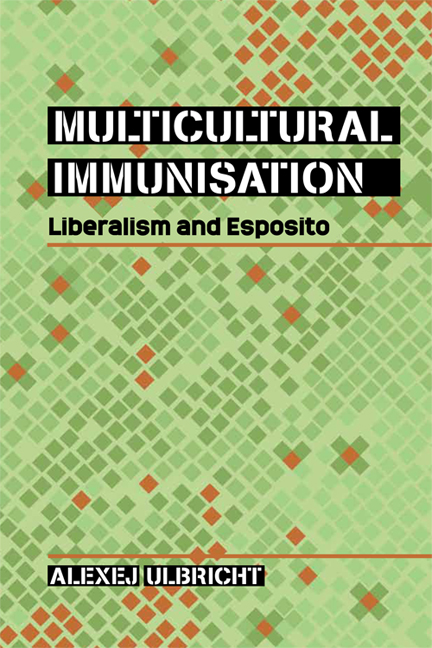Book contents
- Frontmatter
- Contents
- Acknowledgements
- 1 Introduction
- 2 Liberal Thought on Multiculturalism
- 3 Multiculturalism as a Mode of Immunising the Body of Liberalism
- 4 Liberal Multiculturalism and Rights: Citizens, Humans and Other Subjects
- 5 Disagreement and the Horizons of Consensus
- 6 Recognition: Tolerant, and Cunning
- 7 Multiculturalism Beyond Immunity
- 8 Conclusion
- Bibliography
- Index
3 - Multiculturalism as a Mode of Immunising the Body of Liberalism
Published online by Cambridge University Press: 05 August 2016
- Frontmatter
- Contents
- Acknowledgements
- 1 Introduction
- 2 Liberal Thought on Multiculturalism
- 3 Multiculturalism as a Mode of Immunising the Body of Liberalism
- 4 Liberal Multiculturalism and Rights: Citizens, Humans and Other Subjects
- 5 Disagreement and the Horizons of Consensus
- 6 Recognition: Tolerant, and Cunning
- 7 Multiculturalism Beyond Immunity
- 8 Conclusion
- Bibliography
- Index
Summary
Having staked out an outline of liberal thinking on multiculturalism, I turn now to the issue of immunity. As I indicated in Chapter 1, my particular take on immunity takes its lead from the work of Roberto Esposito. I will be arguing that Esposito's conception of immunity can be used to describe what is at work in the logic of liberal multi - culturalism. However, in order to fully make sense of what immunity means for Esposito, it will be necessary to turn first to his specific conception of community. In any case, this conception itself provides a powerful critique of the assumptions at work in liberalism. In this chapter I will be explaining both what community and immunity mean in Esposito, and also how this can help us see liberal multiculturalism as a series of immunitary mechanisms. So in terms of Esposito, I will be engaging principally with his trilogy on immunity, consisting of Communitas, Immunitas and Bíos.
However, in order to make the link to the operation of multi - culturalism, I will also be looking at Julia Kristeva's work on abjection and Michel Foucault's work on delinquency, and will argue that these help us see what happens to actual subjects when they become the subject of immunisation. In the subsequent three chapters, I will relate these ideas directly to the liberal literature on multiculturalism. So, I will now turn, in the first two parts of this chapter, to Esposito's conceptions. The third part will show what happens to actual subjects when they become the subject of an immunitary paradigm. I will conclude by stressing how all this can be operationalised in order to talk about liberal multiculturalism (though I will also be flagging this up as I go along).
COMMUNITY, OBLIGATION AND EMPTINESS
I want to start by looking at the notion of community, something I will also return to in the very last chapter. In Communitas, Roberto Esposito takes us on a tour that traces a genealogy of the importance of community in Western philosophical thought through Hobbes, Rousseau, Kant, Heidegger and Bataille (and uses the prisms of fear, guilt, law, ecstasy and experience respectively to shed light on their thought).
- Type
- Chapter
- Information
- Multicultural ImmunisationLiberalism and Esposito, pp. 45 - 65Publisher: Edinburgh University PressPrint publication year: 2014



